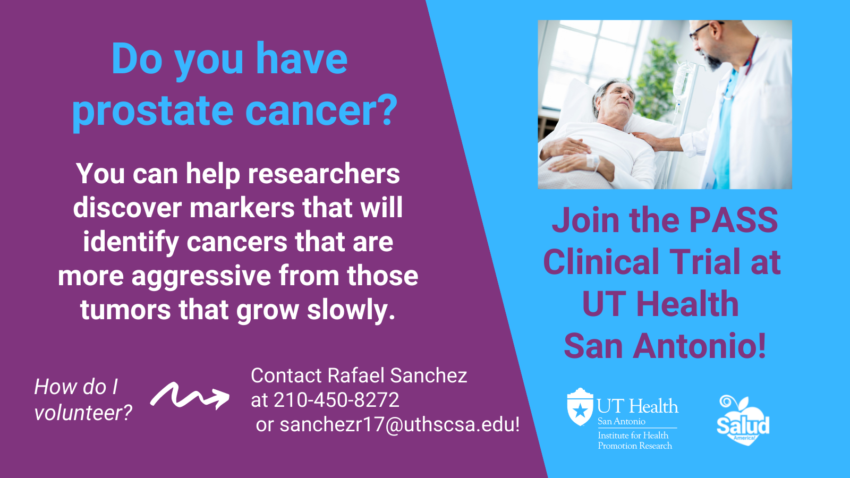
Share On Social!
For Latino men, prostate cancer is the most common cancer diagnosis.
While there is good news—from 2014-2018, Latino men were 20% less likely to face a prostate cancer diagnosis than their white peers—Latino men are more likely than their white peers to be diagnosed at a younger age, and with a higher risk of disease.
This is why researchers at UT Health San Antonio are conducting the Prostate Active Surveillance Study (PASS) Clinical Trial in partnership with the Canary Foundation, a nonprofit dedicated to the early detection of cancer.
The study is for men age 21 and older who have chosen active surveillance as a management plan for their prostate cancer. Active surveillance is defined as close monitoring of prostate cancer with the offer of treatment if there are changes in test results.
The trial will help researchers discover markers that will identify cancers that are more aggressive from those tumors that grow slowly.
“Latino men are suffering at the hands of prostate cancer, which is why we need brave volunteers for this clinical trial,” said Dr. Amelie Ramirez, director of the Institute for Health Promotion Research and the Salud America! program at UT Health San Antonio. “When Latinos step up, it not only furthers the research and save lives, but it ensures that the trial achieves equitable results — representing our communities.”
Join the Prostate Active Surveillance Study Clinical Trial at UT Health San Antonio by contacting Rafael Sanchez by phone: 210-450-8272 or by email: sanchezr17@uthscsa.edu!
What is the PASS Clinical Trial on Prostate Cancer at UT Health San Antonio?
When it comes to cancer diagnoses and early treatment, it is important for physicians to have an idea of how aggressive a cancer might be.
This can influence the ways medical providers treat prostate cancer.
One way these experts can discover the level of risk is by using biomarkers, or “a characteristic that is objectively measured and evaluated as an indicator of normal biological processes, pathogenic processes or pharmacological responses to a therapeutic intervention.” 
The PASS clinical trial, a national study with several sites, including UT Health San Antonio, seeks to discover markers to distinguish aggressive cancers from less aggressive cancers.
“Prostate cancer treatment choices are complicated because the majority of prostate cancers will not be lethal, even if left untreated. Doctors cannot always tell which cancers can remain untreated and which will become more aggressive. As a result, some men may receive treatment unnecessarily and some men may not receive sufficient treatment,” according to the Canary Foundation.
The PASS clinical trial aims to develop new tests and better strategies to help men decide if and when their cancers need treatment.
“Information from PASS is used to develop mathematical models to predict the short- and long-term risks of active surveillance,” according to the Canary Foundation. “The PASS Risk Calculators provide estimates of how likely a man is to have more aggressive cancer in the future. These tools are intended to be useful for clinicians and their patients as they determine optimal methods of active surveillance.”
Join the Prostate Active Surveillance Study Clinical Trial at UT Health San Antonio by contacting Rafael Sanchez by phone: 210-450-8272 or by email: sanchezr17@uthscsa.edu!
Who Can Volunteer for the PASS Clinical Trial on Prostate Cancer at UT Health San Antonio?
Inclusion Criteria:
- Histologically confirmed adenocarcinoma of the prostate.
- Clinically localized prostate cancer: T1-2, NX or N0, MX or M0.
- No previous treatment for prostate cancer (including hormonal therapy, radiation therapy, surgery, or chemotherapy).
- ECOG Performance Status 0 or 1.
- Patient has elected Active Surveillance as preferred management plan for prostate cancer.
- Patient consent has been obtained according to local Institutional Review Board for acquisition of research specimens.
- Patient is accessible and compliant for follow-up.
- Prostate biopsy requirements:
- If diagnosis was within one year of baseline visit, participant must have at least one biopsy with at least 10 cores.
- If diagnosis was more than 1 year prior to baseline visit, participant must have a minimum of 2 biopsies, one of which must be within 2 years prior to baseline visit.
Exclusion Criteria:
- Unwillingness or inability to undergo serial prostate biopsy.
- History of other malignancies, except: adequately treated non-melanoma skin cancer or adequately treated superficial bladder cancer (Ta) or other solid tumors curatively treated with no evidence of disease for > 5 years.
Join the Prostate Active Surveillance Study Clinical Trial at UT Health San Antonio by contacting Rafael Sanchez by phone: 210-450-8272 or by email: sanchezr17@uthscsa.edu!
What Will Volunteers Do as Part of the PASS Clinical Trial on Prostate Cancer at UT Health San Antonio?
According to the researchers, the study’s primary goals are, “to discover and confirm biomarkers that predict aggressive disease as defined by pre-specified histological, PSA, clinical criteria, or outcomes based on these variables.”
Trial participants will undergo assessments through:
 Extended core biopsies
Extended core biopsies- Serum PSA (including PSA kinetics, if available)
- Digital rectal examinations (DRE)
- Assessments of cancer grade and extent
Researchers also note that they also hope to:
- Determine the proportion of patients on active surveillance who progress based on the above criteria
- Determine the clinical predictors of disease progression
Join the Prostate Active Surveillance Study Clinical Trial at UT Health San Antonio by contacting Rafael Sanchez by phone: 210-450-8272 or by email: sanchezr17@uthscsa.edu!
Contact Now to Volunteer for the PASS Clinical Trial on Prostate Cancer at UT Health San Antonio!
Latino men deserve greater access to prostate cancer screening and care.
“In addition to being of lower socioeconomic status and more likely to have public health insurance, Latino men diagnosed with prostate cancer also appear to be more likely to be diagnosed at a younger age, and with higher risk disease,” the Prostate Cancer Foundation states. “[Latino men] are less likely to have a regular doctor and may not have access to educational materials about prostate cancer and PSA screening in their preferred language. When they are diagnosed, Hispanic/Latino men may be less likely to receive optimal treatment.”
Participating in a clinical trial can help you, your family, and future cancer survivors.
Moreover, you can be like Emelia Asto-Flores.
Asto-Flores, a community health educator in Florida, saw how the pandemic devastated Latinos, and she decided to enroll in the trial to help her people.
Not only did she help researchers make sure the vaccine is safe for Latinos, but the trial also gave her the knowledge and confidence to encourage others to get their shot.
“Representation is important in a clinical trial,” Asto-Flores said.
“You wouldn’t want a clinical trial to be just consisted of one group. These results need to be proportionate to our diverse communities. It’s so important for us as members of the [Latino] community to take that leadership role that could save lives. So those that are a part of that can say, ‘Hey, these results care representative of my community.’”
Meanwhile, at UT Health San Antonio, Dr. Amelie Ramirez is creating new ways to encourage Latinos to volunteer for cancer and Alzheimer’s clinical trials. This work is supported by a grant from Genentech, a member of the Roche Group.
“Latinos in clinical trials are not only helping themselves, but they are also building a future with better treatments that can help their families and communities in the future,” Ramirez said.
Join the Prostate Active Surveillance Study Clinical Trial at UT Health San Antonio by contacting Rafael Sanchez by phone: 210-450-8272 or by email: sanchezr17@uthscsa.edu!
Explore More:
Clinical TrialsBy The Numbers
142
Percent
Expected rise in Latino cancer cases in coming years



